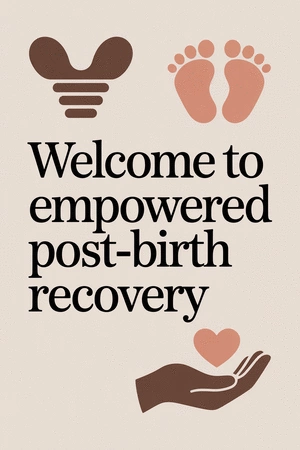"A mother’s mental well-being is crucial for both her and her child's future. What steps can you take to ensure you’re supported on this vital journey?"
What You Will Learn
- Recognize the signs of postpartum depression and anxiety, and know when to seek help.
- Understand the importance of building a strong support network with friends, family, and professional help.
- Explore effective coping mechanisms, including self-care routines and mindfulness practices.
- Learn about the benefits of teletherapy and online support groups for new mothers.
- Discover practical strategies for nurturing yourself through nutrition and exercise.
- Identify barriers to accessing mental health services and how to advocate for yourself.
- Engage with community resources and programs focused on maternal mental health for ongoing support.
Common Mental Health Challenges and Coping Strategies for New Mothers
Understanding the mental health challenges faced by new mothers and effective coping mechanisms can promote better well-being. At Empowered Post-Birth Recovery, we recognize the importance of addressing these issues comprehensively to support mothers effectively.
Postpartum Depression
Common symptoms include persistent sadness and difficulty forming a bond with the baby. Risk factors:
- A history of depression
- Stressful life events
- Lack of support
- Childbirth complications
Anxiety
Excessive worrying about the baby’s health is common. Coping mechanisms include:
- Deep breathing exercises
- Light physical activity
- Journaling thoughts
- Talking to trusted friends
Baby Blues
Characterized by mood swings and sensitivity, usually resolves within weeks. Seek help if:
- Feelings of hopelessness persist
- Difficulty functioning in daily life
- Thoughts of self-harm
Support Networks
A strong support network is vital. Family and friends can help by:
- Babysitting
- Running errands
- Providing emotional support
Mental Health Strategies for New Mothers: Understanding Challenges and Solutions
As a new mother, you might find yourself navigating a whirlwind of emotions. The journey into motherhood is often filled with joy, but it can also bring unexpected mental health challenges. At Empowered Post-Birth Recovery, we understand that it’s vital to acknowledge these challenges and to find effective strategies to address them. Let's explore some of the common mental health issues new mothers face and how we can effectively cope with them!
Identifying Common Mental Health Challenges Faced by New Mothers
Understanding Postpartum Depression: Symptoms and Risk Factors
Postpartum depression (PPD) can feel overwhelming and isolating. Symptoms may include persistent sadness, loss of interest in activities, and difficulty forming a bond with your baby. It's important to recognize that PPD can affect anyone, regardless of their background or pregnancy experience. For more information on physical recovery, consider exploring vaginal birth recovery for moms.
Some common risk factors include:
- A history of depression or anxiety
- Stressful life events, such as job loss or relationship issues
- Lack of support from family and friends
- Complications during childbirth
If you notice these signs in yourself or someone else, it’s vital to seek help! Remember, reaching out is a sign of strength.
New Mother Anxiety: Causes and Coping Mechanisms
Anxiety is another common challenge that can creep in during the early months of motherhood. You may find yourself worrying excessively about your baby's health or your ability to care for them. These feelings are completely normal, and many new mothers share similar experiences.
To cope with anxiety, consider:
- Practicing deep breathing exercises
- Engaging in light physical activity, like walking
- Writing down your thoughts and feelings in a journal
- Talking with a trusted friend or family member
These simple techniques can help you regain a sense of calm and control!
Exploring Birth Trauma and Its Impact on Maternal Mental Health
Some women may experience trauma related to their childbirth experience, which can heavily impact mental health. Feelings of helplessness or fear during delivery can linger long after the baby is born. Recognizing and addressing these feelings is crucial for healing.
Consider seeking support from a professional who specializes in trauma-informed care. They can help guide you through your experiences and provide coping strategies tailored to your needs.
Recognizing Baby Blues: When to Seek Help
Many new mothers experience what is known as the "baby blues," characterized by mood swings, irritability, and emotional sensitivity. These feelings typically arise within the first few weeks after childbirth and usually subside on their own.
However, if these feelings persist or worsen over time, it’s important to reach out for help. Here are signs that you might need support:
- Feelings of hopelessness or despair
- Difficulty functioning in daily life
- Thoughts of harming yourself or your baby
Don’t hesitate to talk to a healthcare provider about what you’re experiencing. There is no shame in seeking help, and support is available! Even gentle physical activity can aid recovery, and you can learn more about postpartum exercise return guidelines to help with your physical and mental well-being.
Effective Coping Mechanisms for New Mothers
Psychological Interventions: Therapy and Counseling Options
One of the most effective ways to manage mental health challenges is through therapy or counseling. Speaking with a mental health professional can provide you with coping strategies and a safe space to express your feelings. Options may include:
- Individual therapy
- Support groups for new mothers
- Cognitive-behavioral therapy (CBT)
Finding the right therapeutic approach can be life-changing!
Building Support Networks: The Role of Friends and Family
Having a solid support network is essential for new mothers. Friends and family can provide emotional support, practical help, and a listening ear when things get tough. Let your loved ones know how they can assist you!
Here are some ways they can help:
- Offering to babysit for an hour or two
- Preparing meals or running errands
- Simply being there to listen
Remember, it's okay to lean on others during this time!
Practical Self-Care Routines Tailored to New Mothers
Self-care is a crucial aspect of mental health, yet it can often fall to the bottom of the priority list. Take the time to do things that bring you joy or relaxation. This could be reading a book, taking a warm bath, or enjoying a cup of tea while watching the sunset.
Consider these self-care practices:
- Establishing a daily routine
- Incorporating gentle exercise, like yoga or stretching
- Setting aside “me time” each day, even if it’s just 10 minutes
Small acts of self-care can lead to big improvements in your mood and well-being!
Partner Support Roles: How Families Can Assist
Your partner plays a vital role in your postnatal journey! Open communication about your needs and feelings can strengthen your relationship and support your mental health. Share tasks and responsibilities to lighten the load.
Consider discussing ways your partner can help, such as:
- Taking on household chores
- Being an active participant in baby care
- Encouraging you to take breaks for self-care
Teamwork makes the dream work, especially when it comes to parenting!
Incorporating Mindfulness Meditation and Relaxation Techniques
Mindfulness and relaxation techniques can be powerful tools for managing stress and enhancing emotional well-being. It’s all about taking a moment to pause and breathe. Simple practices like meditation or deep breathing can help ground you amidst the chaos of motherhood.
Try incorporating mindfulness into your day with these activities:
- Guided meditation apps
- Outdoor walks focusing on your surroundings
- Gentle stretching or yoga
These practices can help you feel more centered and connected!
Nutrition and Exercise for Emotional Well-Being
What you eat and how you move has a direct impact on your mental health! Nourishing your body with healthy foods and staying active can help you feel more energized and uplifted. Aim for a balanced diet rich in:
- Fruits and vegetables
- Whole grains
- Lean proteins
Additionally, regular physical activity can boost your mood and enhance your overall well-being. Even a short walk can make a difference! For those dealing with specific physical concerns, understanding conditions like diastasis recti can be part of a holistic recovery plan.
Digital Health Solutions for Maternal Mental Health
The Rise of Digital Health Tools: Apps and Online Resources
In today’s digital age, there are countless resources available to support your mental health. Mobile apps designed for mindfulness, therapy, and self-care can be incredibly helpful for new mothers! Some popular options include:
- Headspace for guided meditation
- Talkspace for online therapy
- MyFitnessPal for tracking nutrition and wellness
These tools can help you take charge of your mental health journey!
Utilizing Teletherapy: Benefits and Considerations
Teletherapy has become a popular option for many new mothers, allowing you to access mental health care from the comfort of your home. This flexibility can make it easier to fit appointments into your busy schedule.
Benefits include:
- Convenience of remote access
- Reduced barriers to seeking help
- Privacy and comfort of your personal space
Consider teletherapy as an accessible way to get the support you need!
Online Support Groups: Connecting with Other New Mothers
Connecting with fellow new mothers can be a vital part of your healing process. Online support groups provide a platform to share experiences, ask questions, and build community. Look for groups that focus on maternal mental health, as they can provide valuable insights and camaraderie.
Benefits of joining a support group may include:
- Feeling understood and validated
- Finding encouragement and motivation
- Accessing shared resources and coping strategies
Remember, you are not alone in this journey!
Understanding Online Scheduling for Therapy Sessions
Many mental health professionals now offer online scheduling, making it easy to book sessions that fit into your busy life. Familiarizing yourself with these platforms can streamline the process and reduce stress.
Look for features such as:
- Simple calendar integration
- Automated reminders for appointments
- Easy rescheduling options
These tools can help ensure you prioritize your mental health!
Social Media Support and the Motherhood Community
Social media can be a double-edged sword, but it also offers a wealth of support for new mothers. Following accounts that promote positive motherhood experiences and mental health awareness can boost your spirits and provide solidarity.
Engage with supportive communities by:
- Joining parenting groups on Facebook
- Following hashtags like #MomLife and #PostpartumSupport
- Sharing your own experiences and insights
Connecting with others online can help create a sense of belonging!
Accessing Mental Health Services: Breaking Barriers
Cultural Sensitivity and Socioeconomic Factors Affecting Access
Accessing mental health services can be challenging, especially for new mothers facing cultural or socioeconomic barriers. Understanding these challenges is crucial for improving mental health support.
Some barriers may include:
- Lack of culturally competent care providers
- Financial constraints on therapy services
- Inadequate health insurance coverage
Advocating for yourself and seeking out resources that prioritize cultural sensitivity can make a significant difference!
Reducing Stigma Around Maternal Mental Health Issues
Stigma can be a major hurdle for new mothers when it comes to seeking help for mental health issues. It’s essential to foster an environment where mental health is openly discussed and normalized. At Empowered Post-Birth Recovery, we believe that sharing experiences can help break down these barriers.
Ways to combat stigma include:
- Talking openly about mental health experiences
- Educating others about common challenges
- Participating in community awareness programs
Let’s create a supportive community where every mother feels empowered to seek help!
How to Navigate Mental Health Service Utilization
Navigating mental health services can feel overwhelming, but it doesn’t have to be! Start by finding a provider who understands your unique needs as a new mother. Here are some steps to consider:
- Research local mental health resources
- Ask for recommendations from friends or healthcare providers
- Contact potential therapists to discuss their approach and expertise
Taking these steps can help you find the right support!
The Role of Healthcare Providers in Maternal Mental Health
Healthcare providers play a critical role in identifying and addressing mental health concerns in new mothers. During prenatal and postnatal visits, they should routinely ask about emotional well-being.
Here are ways healthcare providers can assist:
- Screening for postpartum depression and anxiety
- Offering resources and referrals to mental health professionals
- Creating a supportive environment for discussing mental health
It’s vital that every new mother feels seen and supported!
Psychoeducation and Early Intervention Programs
Early intervention and psychoeducation can make a significant impact on maternal mental health. These programs provide new mothers with the knowledge and tools to manage their mental health effectively.
Consider participating in programs that offer:
- Workshops on coping strategies
- Information on recognizing symptoms of mental health issues
- Support for developing self-care routines
Empowering new mothers with education can lead to healthier and happier families!
Pro Tip
Did you know? Regularly practicing gratitude can significantly enhance your mental well-being as a new mother. Try keeping a gratitude journal where you write down three things you're thankful for each day. This simple practice can shift your focus from stressors to positive moments, helping to cultivate a more optimistic outlook on motherhood.
Frequently Asked Questions (FAQs)
- Q: What are the common mental health challenges new mothers face?
- A: New mothers commonly face challenges such as postpartum depression (PPD), anxiety, birth trauma, and the "baby blues."
- Q: How can I recognize if I have postpartum depression?
- A: Symptoms of PPD include persistent sadness, loss of interest in activities, difficulty bonding with your baby, and feelings of hopelessness. If these feelings persist, seek professional help.
- Q: What are some effective coping mechanisms for new mother anxiety?
- A: Coping mechanisms include deep breathing exercises, light physical activity, journaling thoughts, and talking to trusted friends or family members.
- Q: When should I seek professional help for the "baby blues"?
- A: While "baby blues" typically resolve within a few weeks, you should seek help if feelings of hopelessness persist, if you have difficulty functioning daily, or if you have thoughts of harming yourself or your baby.
- Q: How can digital health tools support maternal mental health?
- A: Digital tools like mindfulness apps (e.g., Headspace), online therapy platforms (e.g., Talkspace), and online support groups provide accessible resources for mental health support, convenience, and connection with other mothers.
- Q: What role do partners play in a new mother's mental health?
- A: Partners play a vital role by offering emotional support, helping with household chores and baby care, and encouraging the mother to take breaks for self-care. Open communication is key.
- Q: How can I reduce the stigma around maternal mental health?
- A: You can help reduce stigma by talking openly about mental health experiences, educating others about common challenges, and participating in community awareness programs.
Reflecting on Key Takeaways for New Mothers
Summarizing Effective Strategies for Postpartum Mental Health
As we explore this important topic of mental health, it's crucial to emphasize that seeking help is not just okay—it's necessary! Many new mothers face unique challenges, and building a strong support system is vital. Whether through friends, family, or a professional therapist, you don’t have to navigate this journey alone.
Long-term mental health care shouldn’t be overlooked. It’s important to recognize that postpartum mental health is an ongoing journey, not a quick fix. By committing to your well-being, you are setting a powerful example for your children about the importance of self-care and mental health awareness.
- Seek help when you need it—don't hesitate to reach out!
- Establish a support network—friends, family, or professional help can make a difference.
- Prioritize long-term mental health care—it's a journey, not a destination!
Resources for Further Support and Information
Empowered Post-Birth Recovery is here to guide you through your journey of healing and support! There are countless resources available for new mothers seeking information and assistance with their mental health. It can be overwhelming, so I’ve gathered some helpful links and tools to aid in your search.
Here are some valuable resources you can explore:
- Mental Health Organizations: Check websites like Postpartum Support International or the National Alliance on Mental Illness for expert guidance.
- Online Tools: Apps like Headspace or Calm offer mindfulness and meditation resources specifically designed for new mothers.
- Recommended Reading: Don’t miss out on insightful books like "The Fourth Trimester" by Kimberly Ann Johnson.
- Wellness Workshops: Look for local parenting classes or workshops that focus on mental health to gain support and knowledge.
Encouraging Community Engagement for Maternal Mental Health
Your experience as a new mother is unique and valuable. Sharing your journey can help others feel less alone in their struggles. I encourage you to take time to connect with others and share your stories—let’s create a supportive community together! For additional resources and discussions, explore our Additional Resources for New Mothers.
Engagement doesn’t just stop at sharing experiences. Here are some ways to promote awareness and understanding in your community:
- Participate in local maternal health events—your presence makes a difference!
- Engage with social media groups—these platforms can be a great way to connect and share resources.
- Support community outreach programs that focus on maternal mental health—get involved and make an impact!
Remember, at Empowered Post-Birth Recovery, we believe that every new mother deserves compassion, understanding, and support. Reaching out, whether for yourself or to help others, is a step towards healing and empowerment. Together, we can build a strong and caring community for all mothers!
Recap of Key Points
Here is a quick recap of the important points discussed in the article:
- Recognize the signs of postpartum depression and anxiety, including persistent sadness and excessive worry.
- Build a strong support network with friends, family, and professionals to help navigate challenges.
- Incorporate self-care routines that prioritize your emotional well-being, such as regular exercise and mindfulness practices.
- Utilize digital health tools like therapy apps and online support groups to access resources and connect with others.
- Address cultural and socioeconomic barriers when seeking mental health services, advocating for your needs and understanding available resources.
- Engage in community efforts to reduce stigma around maternal mental health and promote awareness and understanding.







